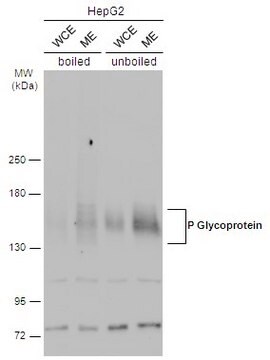MAB4334Z
Anti-MDR1 Antibody, clone UIC2, azide free
clone UIC2, Chemicon®, from mouse
Synonym(s):
P-glycoprotein, CD243, p170, Pgp, MAB4334
About This Item
Recommended Products
biological source
mouse
Quality Level
antibody form
purified immunoglobulin
antibody product type
primary antibodies
clone
UIC2, monoclonal
species reactivity
primate, human
should not react with
mouse, rat
manufacturer/tradename
Chemicon®
technique(s)
flow cytometry: suitable
immunofluorescence: suitable
immunohistochemistry: suitable
immunoprecipitation (IP): suitable
isotype
IgG2aκ
NCBI accession no.
UniProt accession no.
shipped in
wet ice
Gene Information
human ... ABCB1(5243)
General description
Specificity
Immunogen
Application
Immunoprecipitation: 5 - 10 fold molar excess of UIC2 over the expected Pgp concentration; realistically, 1 - 5 ug per 1 μl of cell lysate
Flow Cytometry (conventional and UIC2 Shift assay): depends highly on Pgp expression by target cells; usually, 0.1 μg/mL for low Pgp expressors and 1 μg/mL for high Pgp expressors
Immunofluorescence: depends highly on Pgp expression by target cells; usually, 0.1 μg/mL for low Pgp expressors and 1 μg/mL for high Pgp expressors IHC on frozen and paraffin sections: 1 - 10 μg/mL
Metabolism
Toxicology & Drug Resistance
Physical form
Storage and Stability
Other Notes
Legal Information
Disclaimer
Not finding the right product?
Try our Product Selector Tool.
Storage Class Code
12 - Non Combustible Liquids
WGK
WGK 2
Flash Point(F)
Not applicable
Flash Point(C)
Not applicable
Certificates of Analysis (COA)
Search for Certificates of Analysis (COA) by entering the products Lot/Batch Number. Lot and Batch Numbers can be found on a product’s label following the words ‘Lot’ or ‘Batch’.
Already Own This Product?
Find documentation for the products that you have recently purchased in the Document Library.
Our team of scientists has experience in all areas of research including Life Science, Material Science, Chemical Synthesis, Chromatography, Analytical and many others.
Contact Technical Service







![Poly[4,5-difluoro-2,2-bis(trifluoromethyl)-1,3-dioxole-co-tetrafluoroethylene] dioxole 87 mol %](/deepweb/assets/sigmaaldrich/product/structures/951/320/21327fcd-4960-402d-8ae1-bf2e379cb2e2/640/21327fcd-4960-402d-8ae1-bf2e379cb2e2.png)
